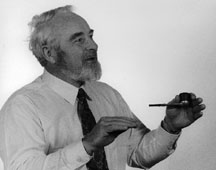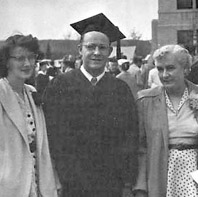T. Neil Davis - Part 2

Neil Davis hasn't always been excited by science and never dreamed it would become
his life's work. Education was of little interest during his adolescence.
"Actually I dropped out of high school right after my sophomore year and decided I
wanted to be a mechanic. I got a job with Wien Airlines in the engine shop as an apprentice
engine mechanic. I was only 15 at the time, so I was too young to sign off on the
engines.
"Other people in the shop had to sign for me. Later on I was the only mechanic Wien
had who could overhaul a DC-3 engine. I'm sure that the passengers would have been
horrified to know that a boy, I was 16 by then, was overhauling the engines they were
flying on."

Davis said his year as a mechanic renewed his faith in education. He returned to high
school, graduated and was accepted at the University of Alaska.
When his doubts about education resurfaced, he decided to hedge his bets and go into
business. He bought a sawmill.
"It was actually a pile of parts, so I built the sawmill and got myself a timber permit."
After working all summer cutting down trees, Davis earned enough to pay for the sawmill
and have $300 left over.
"I guess all that hard work convinced me to go to school. I took my $300 and entered
the university. I really didn't have enough money to go anywhere else," he said.
Davis first worked for the chemistry department and later began carrying water for
the Geophysical Institute.
The next year, with more money and wanting a change, he transferred to what is now
Iowa State University. When he got homesick, he headed back up north, where he finished
his final two years at the University of Alaska.

His experiences of growing up in the North Pole area, going outside to school and
returning, gives him a unique perspective on today's young Alaskans.
"I know there is a lot of concern about whether the University of Alaska draws enough
of the state's high school graduates. From what I've seen around the state, most of
the kids do think highly of the university. But most of them just want to get away
from home and see another part of the world. I don't think there should be as much
concern as there is on the part of our legislators and educators."
The majority of students who leave the state for their education eventually return,
he said. Both of his daughters are now enrolled at UAF.
The University of Alaska and the Geophysical Institute have played a major role in
Davis' life and he has watched them grow from relatively small institutions to larger,
world-recognized organizations.
In the Institute's early days, undergraduate students frequently worked on projects
which would have been restricted to graduate students at other universities. Students
were given more responsibility and Davis feels this helped them reach their potential.
Today the Institute's staff is much larger and generally older.
In his retirement Davis plans to concentrate on writing the projects he's been interested
in but hasn't had time for in the past. Preparing for his increased freedom, he is
outfitting his van with a computer so he can work on his projects from whatever stream
he's fishing.
"James Michener was quoted in Reader's Digest as saying, 'It doesn't make any difference
what you do up to about age 45. After that, things get serious, and it's important
to use your time as well as you can.' Since I've passed the 45-year mark, I guess
it's time to get serious," Davis said.
UA Site named after T. Neil Davis
T. Neil Davis is also mentioned in these other articles:
Geophysical Institute History "Chapman-Elvey Era"
Links:
Davis, T. Neil. The College Hills Chronicles: How the University of Alaska Came of Age. Fairbanks: University of Alaska Foundation, 1992. Print. ISBN: 1883309018
Davis, T. Neil. Cause of the 1967 Fairbanks Flood, Article #177, Alaska Science Forum, August 6, 1977
